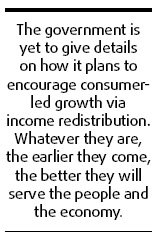Editorials
Income-fueled growth
(China Daily)
Updated: 2009-12-09 07:57

Efforts to boost income growth are certainly needed as China tries hard to make domestic consumption a new growth engine. But no less important are redistribution efforts to enhance the purchasing power of the many low-income families.
The decision that Chinese authorities made at the recent Central Economic Work Conference to strengthen income redistribution next year has obviously struck a chord in the hearts of the public.
Even the worst global recession in several decades has not stopped the continuous income growth that Chinese people have been enjoying over the past three decades.
Such income growth must have contributed considerably to the country's broad-based pickup in consumer spending. Retail sales increased by 17 percent in real terms, pushing up the country's gross domestic product growth by 4 percentage points.
However, in spite of the greater role domestic consumption played in stoking economic growth, consumer-led demand is still nowhere near enough to make up for declining exports this year, not to mention picking up the potential slack if the country reduces its dependence on investment for growth.
Since everyone knows that one cannot make bricks without straw, it is easy for Chinese policymakers to reach a consensus on the need to increase household incomes.
But the country's fairly high savings ratio indicates that boosting domestic consumption is not all about keeping raising incomes.
In addition to an inadequate social welfare net that has long depressed consumption, the widening income gap has emerged as an increasingly big consumption restraint.
The meeting, which is held once a year in Beijing to set the tone for economic development for the next year, emphasized that a good balance should be kept in maintaining a relatively fast and stable economic growth, economic restructuring and dealing with predicted inflation next year.
The message from top Chinese officials is encouraging. They have not only recognized the urgency of income redistribution, but also decided to address the problem.
To lower the country's savings ratio to help ease global imbalances, policymakers should take measures to distribute more corporate earnings, which are the main driver of the nation's increased savings, to individuals.
To narrow the income gap, the country may need to fine tune its tax and fiscal policies in favor of low-income households.
The government is yet to give details on how it plans to encourage consumer-led growth via income redistribution. Whatever they are, the earlier they come, the better they will serve the people and the economy.
(China Daily 12/09/2009 page8)













